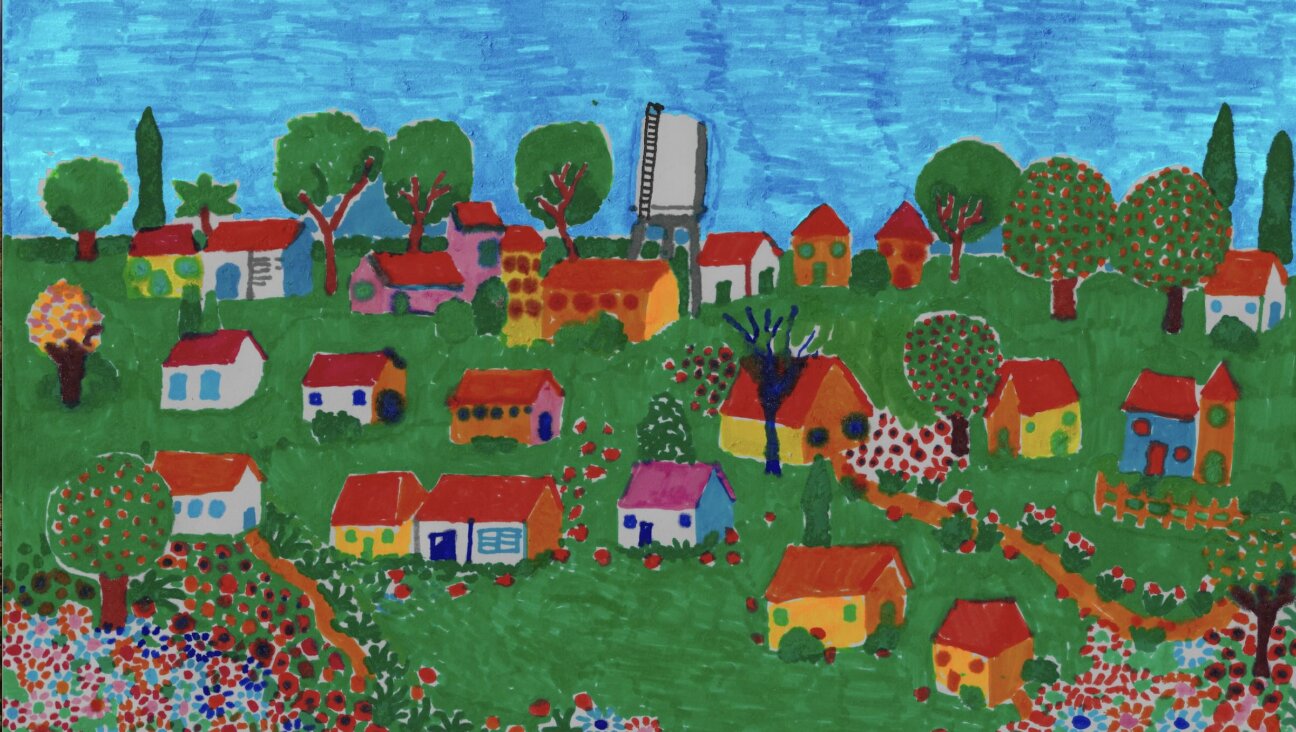‘Please don’t stop’: Pandemic project of daily Magna-Tiles messages passes 1,000-day mark
Despite rising antisemitism, family proudly displays Jewish and Hebrew phrases on garage doors
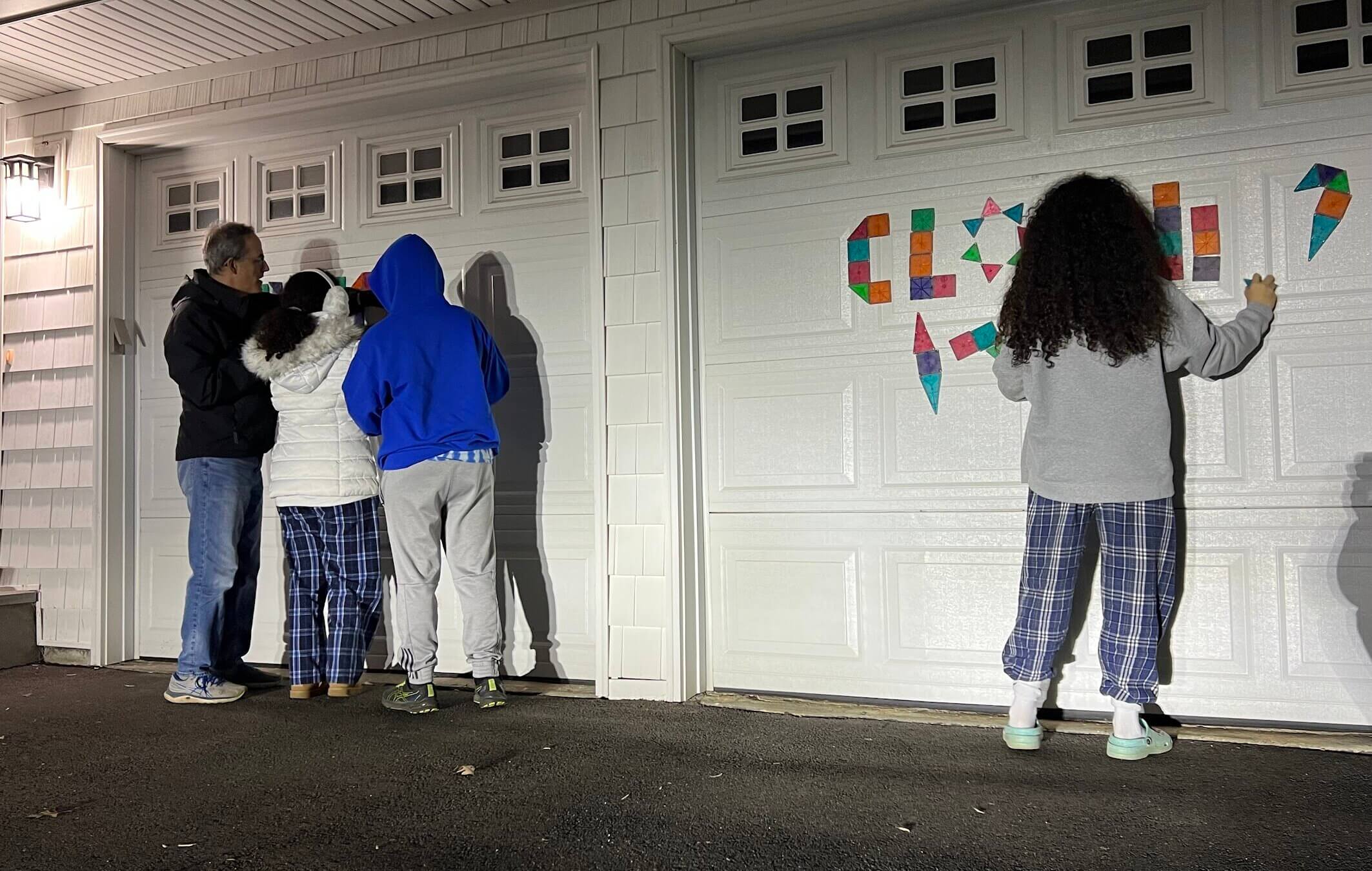
Alan, Shira, Tali and Rami Tuvin rearrange magnets spelling out “WHEN WILL IT END?” into “PITCH CLOCK” for Major League Baseball’s opening day and the new rule intended to speed up the games. Photo by Scott Sadowsky
The first Magna-Tiles message the Tuvin family posted on their garage doors in West Hartford, Connecticut, was simple and straightforward. It was March 27, 2020, two weeks into COVID lockdown, and it was a Friday. “Shabbat” read the colorful magnets on one door. “Shalom,” said the other.
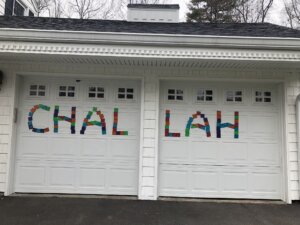
Two weeks later, on the day Jews everywhere experimented with their first virtual Seders, they made the magnetic squares spell out “Chag Sameach” — in Hebrew. When Passover ended, they posted CHALLAH in giant letters. These were followed by “Never Forget” on Holocaust Remembrance Day, a heart and “Earth” for Earth Day, and “Shabbat is Here” the following Friday.
And since April 29, 2020, when they constructed Israeli flags in blue tiles in honor of Israel’s Independence Day, they have posted new missives and musings every evening. For more than 1,000 days now, the family has been sharing holiday greetings, gentle commentary on local happenings or national politics, and more. “There’s a Fly on His Head,” the garage said the morning after the 2020 vice-presidential debate. “Not Throwin’ Away My Shot” was the message when vaccines were first released. They celebrated Little League opening day after lockdown and a big “Good Riddance 2020” on Dec. 31.
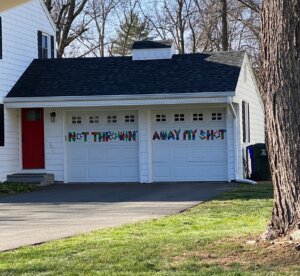
The everyday audience of the Tuvins’ quirky project were their neighbors.
A lifeline for neighbors
“When the Tuvins first started posting their signs it felt like a lifeline,” said Hannah Zweibel, who lives a block away. “We were all in isolation, not meeting up with anyone else, only taking walks as a family. Their signs were a friendly reminder that we were all in this together. Even as the world slowly got back to normal, I would still walk by their garage door almost every day.”
I live a few miles away, and still took my kids on many lockdown field trips to see the Tuvins’ garage doors. The family is among a rarefied group of people I think of as “creative long-haulers” — those who have kept whimsical pandemic projects going far longer than anyone would have expected.
Other pandemic projects
There’s Diana Ulman, a Maryland artist who has chronicled the ups and downs of the past three years with daily line drawings on her Instagram feed. There’s Carol Dorf, a California math teacher who shares a work by a contemporary poet — always a Jewish one on Fridays — by email to 110 friends and friends of friends.
And then there’s Glenn Raucher, who lives in Manhattan’s Hell’s Kitchen neighborhood, and once managed Lincoln Center and the reading series at the now-shuttered Chelsea literary haven, Half King Bar. On March 19, 2020, Raucher posted a selfie on his Facebook page with “The Royale” — a term for the first and best cup of coffee of the day coined on Twitter by Billions producer Brian Koppelman — and a morning update, and invited his friends to do the same.
“I needed to see people’s faces,” Raucher said. “I tapped into something within my cohort; it became a place to connect and an accountability check as we handled depression and grief.”
For the Tuvins — Karen, a real-estate broker; Alan, an insurance executive, Shira, who is 13, and 12-year-old twins Tali and Rami — it’s both a family and community ritual. They brainstorm each message at dinner, and post before going to bed, so that early-morning dog-walkers, joggers and kids heading to the school bus will have something fresh every day.
When they go out of town, the Tuvins rely on friends to put up the magnets; I signed up to take a turn when they’re traveling for Passover this year. The only rule is that the message cannot be offensive. (The kids once vetoed Dad’s “Damn Yankees,” deeming “damn” too profane.)
Jewish values and social justice
The Tuvins said the project has prompted lots of family conversations about Jewish values and social justice. They posted “We Shall Overcome” after the 2020 police murder of George Floyd; “I have a dream” during the Kenosha, Wisconsin, riots that followed the police shooting of Jacob Blake; “Rock your Socks” to remind people to wear colorful mismatched socks i
n honor of Down Syndrome Awareness Day (March 21); and, most recently, “Girlcott Walgreens” after the drug store chain announced it would stop selling abortion pills.
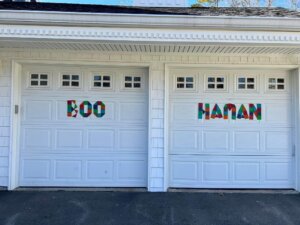
All of which goes against the advice Karen Tuvin gives clients when they are staging their homes for sale. She guides them to eliminate décor that will reveal their identity, especially in terms of age, career, family makeup, race, religion or political leanings. Yet her family’s religion, values, hobbies and sensibilities are on display in a way that looms larger than a lawn sign — or a mezuzah.
“I fail my own test,” she admitted. “Before anyone gets in my home, they’re going to know exactly who I am.”
At a time of rising antisemitism, they have not hesitated to post messages in Hebrew or with Jewish themes. “It would be impossible to not include our Jewishness,” Karen Tuvin explained, “We send our kids to Jewish day school, we go to synagogue, I’m on the board of the JCC. There isn’t anything that we do that doesn’t have a touch of Judaism in it.”
West Hartford’s mayor, Shari Cantor, who is Jewish and lives around the corner, pointed out that Jews were excluded from living in the neighborhood for decades after its mostly Tudor homes were built in 1929 and 1930. Today, the area is popular with Shabbat-observant families, because it is within walking distance to three synagogues and the JCC. (It’s also close to the Hartford Golf Club.)
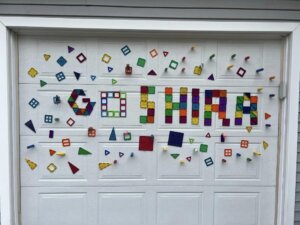
Debating Jewish messages
Karen Tuvin said that they “try hard to be inclusive” and respectful of neighbors’ diverse faiths and political views. The family sometimes debates whether to write a greeting in Hebrew, English or transliteration. They know Purim messages like “Boo Haman” and “Apricot or Peach” may have been lost on some passersby, but they hope that just spurs some Googling and conversation.
They said no one has ever moved or removed a single tile (though some have gotten stuck in the well above the garage door tracks).
Instead, there are fans who take pictures of the doors every day, kindergarteners who pause in the driveway to sound out each word, dog walkers who shout comments as they pass, and trick-or-treaters who say, “Please, don’t stop.” People they do not even know have made donations in the Tuvins’ honor to local charities including the West Hartford Food Bank and Jewish Family Services.
And for Shira’s bat mitzvah in August, a dozen friends posted “Mazel Tov” on their own garage doors, some in magnetic tiles, others with square Post-it notes and paper signs.
A message from our Publisher & CEO Rachel Fishman Feddersen

I hope you appreciated this article. Before you go, I’d like to ask you to please support the Forward’s award-winning, nonprofit journalism during this critical time.
We’ve set a goal to raise $260,000 by December 31. That’s an ambitious goal, but one that will give us the resources we need to invest in the high quality news, opinion, analysis and cultural coverage that isn’t available anywhere else.
If you feel inspired to make an impact, now is the time to give something back. Join us as a member at your most generous level.
— Rachel Fishman Feddersen, Publisher and CEO











